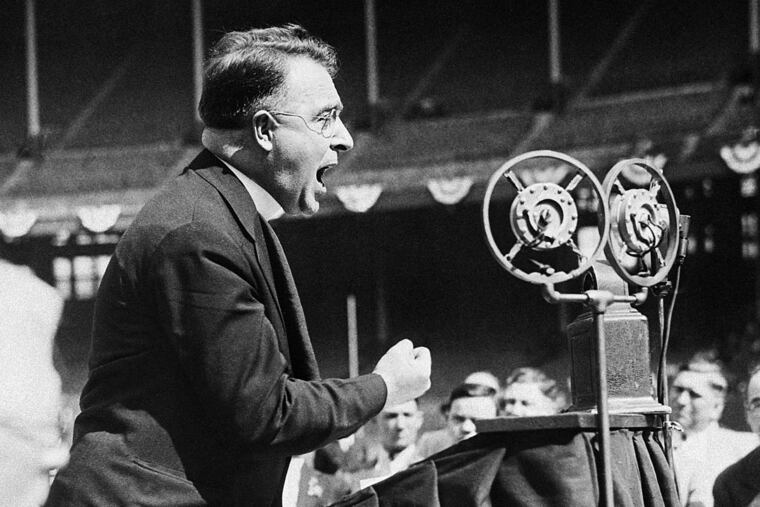Candidates' economic policies a cause for concern
It is shocking, at least to me, that businessman Donald Trump appears on track to be the Republican nominee for president. Sen. Bernie Sanders' success in the Democratic race is equally surprising. Both candidates seemed on the far fringes of the presidential race just a few months ago. What's going on?

It is shocking, at least to me, that businessman Donald Trump appears on track to be the Republican nominee for president. Sen. Bernie Sanders' success in the Democratic race is equally surprising. Both candidates seemed on the far fringes of the presidential race just a few months ago. What's going on?
"It's the economy, stupid."
There's no dispute that our economy has made big strides since the Great Recession. Businesses have added jobs for a record six consecutive years, and unemployment has fallen below 5 percent, which is roughly consistent with a full-employment economy. Nearly everyone who wants a job has one.
Yet despite this progress, many Americans are barely able to tread financial water. They have a job, but their wages have struggled just to keep pace with inflation. After accounting for the rising cost of rent, health care and other living expenses, people's pay has gone nowhere.
Many people are also less wealthy. House prices have steadily risen in recent years, but they have yet to recover from the housing bust in most parts of the country. The number of underwater homeowners - who owe more on their homes than they are worth - has fallen significantly, but millions are still in this uncomfortable position.
Stock prices are way up from their recession lows, the recent turmoil in the stock market notwithstanding, but the principal beneficiaries are the wealthiest Americans. Which gets to another tailwind behind the Trump and Sanders' candidacies, namely the perception that the economy is rigged.
This distrust has several strands. The most strident view is that the economy is literally rigged. Wall Street uses its money and influence to bend politicians and the political process to its will. The big banks are able to change laws and regulations to make bigger profits at the expense of everyone else.
Others aren't as cynical, but they are deeply suspicious that the economic system will ever benefit them. From their perspective, increased global trade and foreign immigration have forced them into lower-paying and less-rewarding jobs. And even these jobs feel very fragile because new technologies seem poised to wipe them out.
The last time so many Americans felt this economically disenfranchised was in the 1930s Great Depression. The politics of the time were equally as dyspeptic. Among the most rancorous figures was Father Charles Coughlin, the first to effectively use the radio as a political tool. He lashed out against President Roosevelt for being, Coughlin thought, too cozy with the banks and the Federal Reserve. Sound familiar?
Of course, the political middle won the day back then, and thank goodness. The economy ultimately righted itself, in large part due to Roosevelt's economic policies, and went on to enjoy a long run of strong growth and low unemployment. The good times benefited everyone from the top to the bottom of the income scale.
This isn't necessarily to argue that the economic policies of the Obama administration will result in a similarly strong U.S. economy in the years ahead, but it is to argue that many of the policies espoused by Trump and Sanders would ensure that it would not.
Most obvious are the Trump proposals to deport 11 million undocumented immigrants living and working in the U.S., and to build a "real wall" between the U.S. and Mexico. Putting aside the humanitarian implications of mass deportation, this would be extraordinarily bad business. Many U.S. companies wouldn't be able to fill open positions, severely disrupting their activities, and costing American citizens their jobs. It isn't excessive to believe that the economy would sink into a deep downturn.
Arizona, which implemented tough anti-immigration laws nearly a decade ago, provides a sobering case study of what to expect. The state's economy has suffered mightily. To be sure, there are many reasons for this poor performance, but the exodus of immigrants is an important one.
Sen. Sanders proposes to massively increase government spending on education, health care, and other things (things we all want), but he doesn't provide a credible way to pay for it all. Taxing the rich more gets you only so far, and arguing that the policies will lead to unprecedented economic growth, and thus the revenues needed to pay the bills, is specious.
According to the nonpartisan Congressional Budget Office, lawmakers must soon become more prudent in their taxing and spending policies, or the nation will face serious fiscal and economic problems in the near future. Sanders' proposals are far from fiscally prudent.
It is critical that our next president quickly embraces policies that lift the financial fortunes of everyone. These include immigration reform, which involves allowing more skilled workers into our country and a path to citizenship for the undocumented; more investment in the nation's infrastructure, financed by partnering with the private sector; and reform of the dysfunctional corporate tax code.
Our economic future is bright just as long as we don't lose our way by following the brashest and most strident voices.
Mark Zandi is chief economist of Moody's Analytics. help@economy.com.